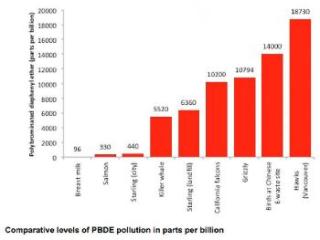Apr 24 2015
A Cooper's hawk, found in Greater Vancouver, is the most polluted wild bird that has been found anywhere in the world. A team of Canadian researchers made this startling discovery while analyzing liver samples from birds of prey that were discovered either injured or dead in the Vancouver area.
The levels of polybrominated diphenyl ethers (PBDEs) in the contaminated Cooper's hawk were 196 parts per million, significantly higher than those recorded in birds found either in cities in California or in an electronic waste site in China. PBDEs are a group of chemicals that act as flame retardants and were once used widely in computers, stereos, televisions, vehicles, carpets and furniture.
 A Canadian research team has discovered the most polluted wild bird found anywhere in the world. Credit:Kyle Elliott
A Canadian research team has discovered the most polluted wild bird found anywhere in the world. Credit:Kyle Elliott
Although many of the PBDEs have been banned since the 2000s in Canada, they continue to accumulate in landfill sites where people dispose of PBDE-rich items. In British Columbia's Fraser River delta, for example, the quantity of PBDEs has doubled every four years over the past four decades. This can have a significant effect on the bird populations that live nearby.
"Many animals, including coyotes, eagles and hawks benefit from the excess food in our cities. A downside is the high levels of pollution. The levels of flame retardants in starlings, a favourite prey of hawks, which nested near the landfill site were fifteen times higher than levels in starlings found elsewhere in Vancouver," says Prof. Kyle Elliott, of McGill's Department of Natural Resource Sciences, one of the authors of the study which was recently published in the journal Science of the Total Environment. "We were surprised to see such high levels of contaminants in what I think of as 'green' city. We can only hope that because many forms of PBDEs have now been banned and the levels of these contaminants are rapidly disappearing from herons and cormorants in Vancouver, the same will be true for other bird species."
Source: http://www.mcgill.ca/